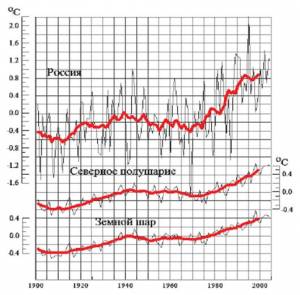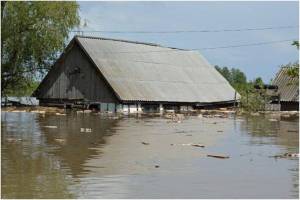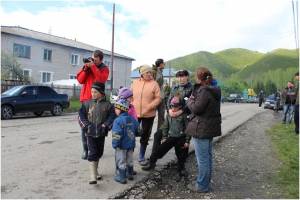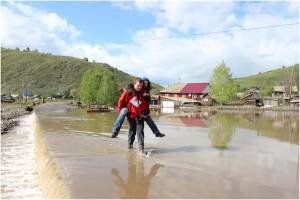Climatologists’ predictions of the natural disasters doubling are sadly getting confirmation. Now it’s Altai’s turn. Learn how you can help the victims of flooding and prevent catastrophes in the future.
The sunken Altai
In the last few years, it’s hard to get rid of the impression that natural disasters have become an unpleasant routine. The latest news from Altai about people who lost their homes, are missing or perished, literally seize the baton from the recent Serbia floods’. Last summer there was powerful flooding on the Amur river. Earlier, there was one in Krymsk. And destructive wildfires occur almost every year. They eliminate hundreds of thousands hectares of forests, whole villages and unfortunately human lives. The adjective “unprecedented” has become a routine one. Now they speak this way about Altai, a week earlier the same was said about Serbia, a year earlier about Khabarovsk.
The main question about all this should be whether we deal with random coincidence of adverse events and management errors or it is about consequences of that very “global climate change”, the one which is discussed on the UN conferences but which Russia hardly takes seriously.
People’s tragedies in the disaster zone and the authorities’ inefficiency have become a routine. Here are several messages from Altai:
“Bystryi Istok, where Valeriy Zolotukhin, an iconic Russian actor, was born, is still flooded. The majority of its inhabitants have been evacuated to the village called Priobskoye. Natalya from Bystryi Istok is in Priobskoye now, in the school where
a temporary shelter for victims is located. Natalya reports by the phone: ‘To say the truth, the rescue operation in Bystryi Istok was a very low-level one. During the first day of the disaster people were rescuing themselves as best they could…” More
A journalist from the Altapress news agency Lidiya Sokokova is now in Priobskoye village, where the flood victims have partly been evacuated to:
“I’m at a local school. There are 500 evacuees. They say a lot of people died. The police don’t have the exact data. Tomorrow we’ll try to find out the exact information about the deceased in an investigation committee…” More
“A family of five affected by the flood in Charyshskoye lost their home. They have to live in cars because there is no place left in temporary shelters. At night the outside temperature is about zero. They have received only 10 thousand rubles for the whole family…”
Read more on the Facebook page of Yuriy Kotenev, a local
Trend or coincidence?
Is there a way for us to know whether we’re dealing with a random coincidence of adverse events or with an objective trend which has scientific explanation and was possible to predict?
It appears that one can easily find an answer to this question. In 2005, the Russian Meteorological Center published a paper under a promising title “The strategic forecast of the climate change in the Russian Federation, 2010-2015”. It’s always useful and enlightening to read old forecasts. One can see at once which opinions and theories helped predict the future and which ones proved to be no more than a curious thing like a cannon for the Moon trips from Jules Verne’s books.
The first thing we see after having cut a swath through the dense officialese is that recent climatic disasters can’t be seen as unexpected. They were predicted, clearly and unambiguously:
“Effects of the rapid climate change have become apparent in the increase of dangerous meteorological events (floods, avalanches, mudflows, hurricanes, wind gusts etc.) and of poor weather conditions which cause huge social and economic damage…”
Incredible as it is, the places where the most powerful floods occurred within a few years were mentioned in this 10-year-old report! Altai, the Far East, Northern Caucasus were directly pointed out as high risk zones of natural disasters due to the climate change.
Even natural disaster frequency growth which we face today wasn’t unexpected. Having processed data from all over the country, the scientists concluded that by 2005 the number of natural disasters had been increasing at an average 6.3% per year. And this trend was to go on: “The continuation and even rise of these trends of climate change which is expected in different Russian regions in the nearest time (at least next 5-10 years) should already be taken into consideration in the weather-dependent branches of the economy, in the development of social infrastructure…” It’s easy to count that if the Center’s scientists were right, the number of the natural disasters may have doubled in the last fifteen years.
Unfortunately, their predictions are coming true. According to the Emergencies Control Ministry (EMERCOM), during the last 20 years the number of dangerous natural disasters has rapidly increased. First of all it concerns big floods. Their number has grown more than twice. According to director of Antistikhiya Center Vladislav Bolotov, their characteristics “increasingly beat the record, i.e. they are registered for the first time” (source, source).
So what we face is a predicted and clearly observed pattern rather than a merely random coincidence of adverse events. Importantly, this conclusion is hardly that of the perennially eco-minded environmentalists; it comes from the official institutions responsible for forecasting and mitigating natural disasters in Russia. To ignore this means endangering thousands of human lives.
The researchers have pointed out to global climate warming as the cause of the climatic disasters directly and unambiguously; the warming is by the way twice as fast in Russia compared to the planet average.

Abnormal surface air temperature yearly averages: upper – Russia, middle – Northern Hemisphere, lower – Global
“The calculation of the hydrodynamic models ensemble, even under differing scenarios of the global economic development (with differing amounts of the greenhouse gases emissions), as well as the statistical model calculations for the nearest 10 to 15 years suggest very similar findings […] that fit the IPCC estimation very well”, a quote from a 15-year-old Russian Meteorological Center report says. This report was a prophetic one. So the “global warming” is sadly not just a warm winter and hot summer. According to director of the Situational Centre of the Russian meteorologists Yuriy Varakin, “the entire [climatic] machine has lost balance; we have more powerful cyclones that possess more potential energy, cover larger territories and carry correspondingly more water, they also have longer lifespans” (source).
The scientists’ gloomy climate forecasts tend to prove true also outside Russia. Take for example what the IPCC report says: “The researchers are already observing numerous climate warming-related changes, for instance, the increase of the summer heat in North America, Europe, Africa and Asia. Disastrous floods have become more typical in Africa and Australia, while in Europe and North America heavy showers gain strength. The melting Arctic ice threatens not just polar bears but also the indigenous peoples’ means of subsistence in the North of Canada” (source).
It is not irrelevant to remind that the very global warming as the result of the increased CO2 concentration was also predicted beforehand by outstanding chemist and one of the first Nobel Prize winners Svante Arrenius way back in 1896. Alas, it seems the mankind is hardly good at hearing the scientists’ global forecasts, and this hits back all the more often.
What can help?
To prevent the worst outcomes of the climate change we must gradually drop the use of coal, oil and gas (source).
But can we as individuals do something right now to prevent the worst case scenario? Here are a few simple things where everyone’s help is needed:
1. Help the Altai floods victims:
- Lisa Alert has started collecting humanitarian aid for those affected in Altay, their VKontakte page (in Russian) is https://vk.com/la_altay
- The Altay Krai authorities have announced the aid campaign for the flood victims. Please make your transfers to the foundation account with a message: “Charity donation for flood victims of Charysh rayon”. Banking details are: INN (ИНН) 2225018635 KPP (КПП) 222501001 account # 40703810002140010252 control account # 30101810200000000604 BIC 040173604 Branch # 8644 of Sberbank of Russia, Barnaul city
- Petition the Russian Federation government to demand that EMERCOM starts extinguishing the wildfires right now. Sign here.
Today the EMERCOM forces are not ready to withstand natural climatic disasters including not just floods but also wildfires. Given the lack of snow in winter and the abnormally hot spring, we are really threatened by a smoky 2010 summer remake. Turf is already burning in a number of regions, and EMERCOM takes no measures.
3. Petition governments to demand a halt to the Arctic oil drilling. Sign here.
Russia is not only a victim of the global climate change but one of its principal architects. One of the main sources of CO2 in the atmosphere is oil and petrol products burning. Russia is world’s second oil trader after Saudi Arabia. Out of over 500 mln tn of oil extracted in Russia in 2013, over 70 per cent was exported. At the same time, while boasting of developing the most advanced industries, local manufacturing and support for agriculture, the Russian government has planned to invest over 900 bn of taxpayers’ money in the extension of oil extraction. Suggested are not just extremely risky projects of the Arctic shelf oil drilling that threaten to both contribute to the global warming and enable local disasters akin to the one that occurred in the Bay of Mexico. Such plans are unfortunately underway in the US, Norway and some other countries.
4. There is a global movement against climate change. Join us and launch your own projects to solve the climatic crisis https://world.350.org/russian/
–
Mikhail Matveyev, Moscow, 350.org



